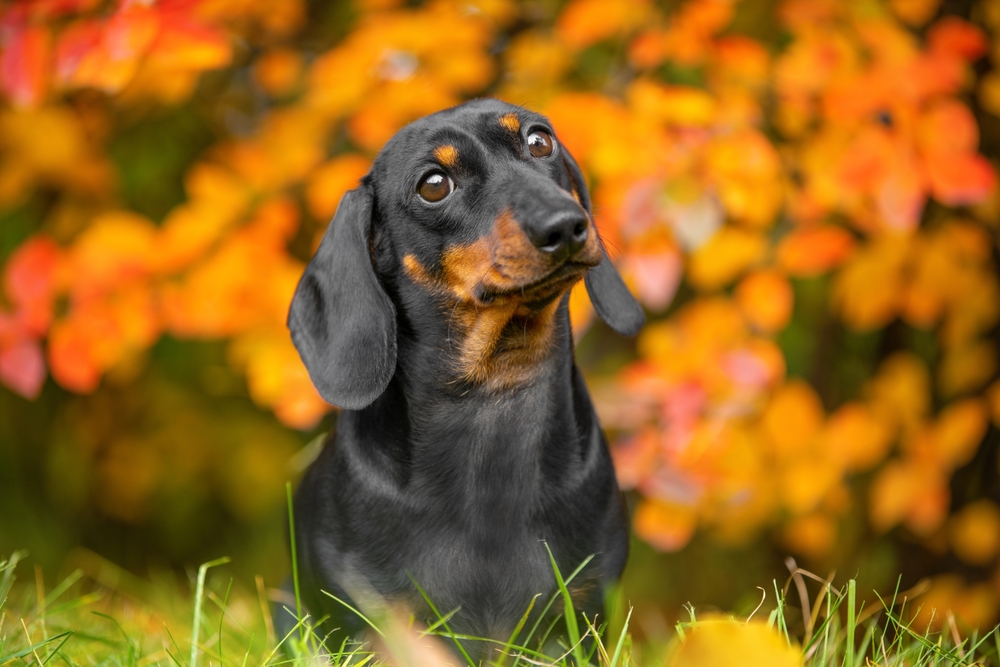Click Below to Skip Ahead
Rottweilers are one of the most recognizable breeds out there, with a signature black-and-tan coat, a solid build, and a surprisingly relaxed manner. Many people look at these drooly giants and get intimidated, but Rotties are actually a perfect choice for a family dog, working dog, guard dog, or even police dog. If you’re thinking about welcoming a Rottweiler into your home or just want to know a little more about them, you’re in the right place. Scroll down for all the info you could ever need to know about this breed and how to take care of them.
Breed Overview
Height:
22 to 27 inches
Weight:
105 to 130 pounds
Lifespan:
8 to 12 years
Colors:
Black, tan, rust, mahogany, brown
Suitable for:
Active families with older kids, active singles, those in need of a powerful working dog
Temperament:
Easygoing, confident, loyal, affectionate
Rottweilers are known for their intense guarding instinct to strangers, but their families know them as lovable, chill goofballs. This breed is one of the top choices for loyalty too, with an unwavering devotion, trainability, and eagerness to please. While they’re not the best pick for the faint of body due to their ripped physique, Rottweilers make a great pet for almost any home.
Rottweiler Characteristics
Rottweiler Puppies
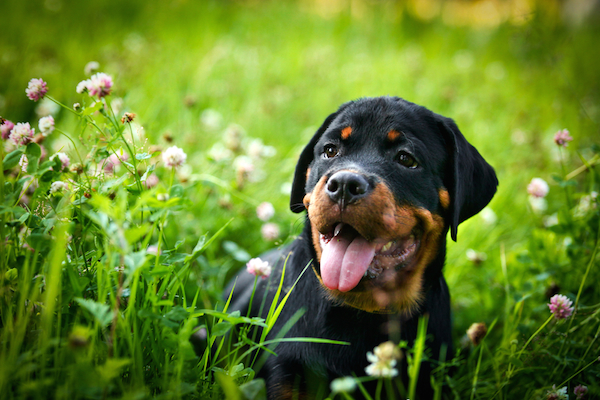
Responsible and reputable Rottweiler breeders screen for health, genetics, and temperament early in a puppy’s life. Before buying a puppy from a breeder, you should ask to visit their facilities. If they refuse or want to meet in public, that’s a red flag that the breeder is not legitimate and isn’t being transparent. Once there, you should ask to see the parents, or at least photos if they’re not on-site.
You can roughly tell what a puppy will look like at maturity by looking at their parents, and this is a good chance to visually check for any signs of skin problems, fleas, malnourishment, or conditions like dysplasia. At this time, you should also ask for the litter’s health screening, which any reputable breeder will gladly show you.
If at any time you feel dishonesty from the breeder and they decline to clarify or answer follow-up questions, it’s a good idea to move on to a different breeder.
Temperament & Intelligence of the Rottweiler 🧠
Rottweilers are good-natured dogs with a confident, fearless personality. They’re not afraid of anything, whether it’s an intruder or a squirrel at the dog park. Rotties are a famously loyal breed that takes the job of family guardian very seriously, bearing no love for strangers. They’re most at home with their favorite people in their comfortable, familiar home. When they really feel at ease, you may even see a Rottweiler “let their fur down” and get into clownish hijinks. They have a wicked sense of humor and love making you laugh!
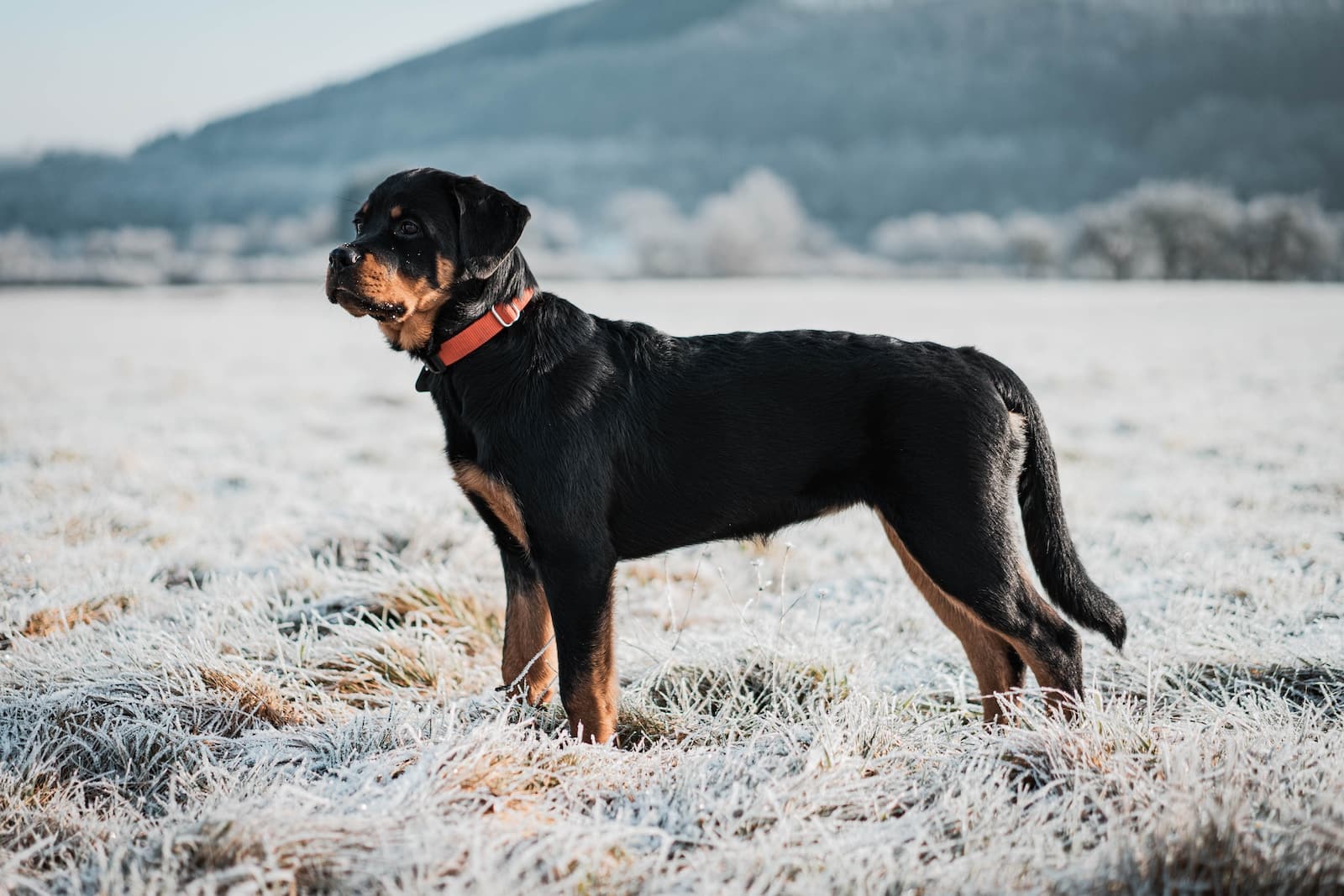
Are These Dogs Good for Families?🏡
Yes, the Rottweiler’s placid demeanor makes them ideal for families, but their large size and great strength mean we don’t think they’re a great fit for families with small kids. They can be with ample socialization and obedience training, but it takes a lot of work and supervision. Older children taught how to respectfully interact with a Rottweiler are likely to find a furry friend for life.
Does This Breed Get Along With Other Pets?
Rotties are standoffish dogs with strong territorial and guarding instincts, so they aren’t naturally inclined to be fast friends with other dogs. This can be tempered with lots of early socialization, especially with the pet(s) you want them to get along with. Still, Rotties get along best with other large dogs that can stand up to their occasionally rough play.
Things to Know When Owning a Rottweiler
Food & Diet Requirements🦴
Rottweilers are stout, robust dogs with a hearty appetite to match, so you need to make sure they get enough high-quality nutrition. You want to aim for 22% to 26% protein content from lean meats like lamb, chicken, or turkey, with a good balance of healthy fats, carbs, and trace vitamins/minerals as well.
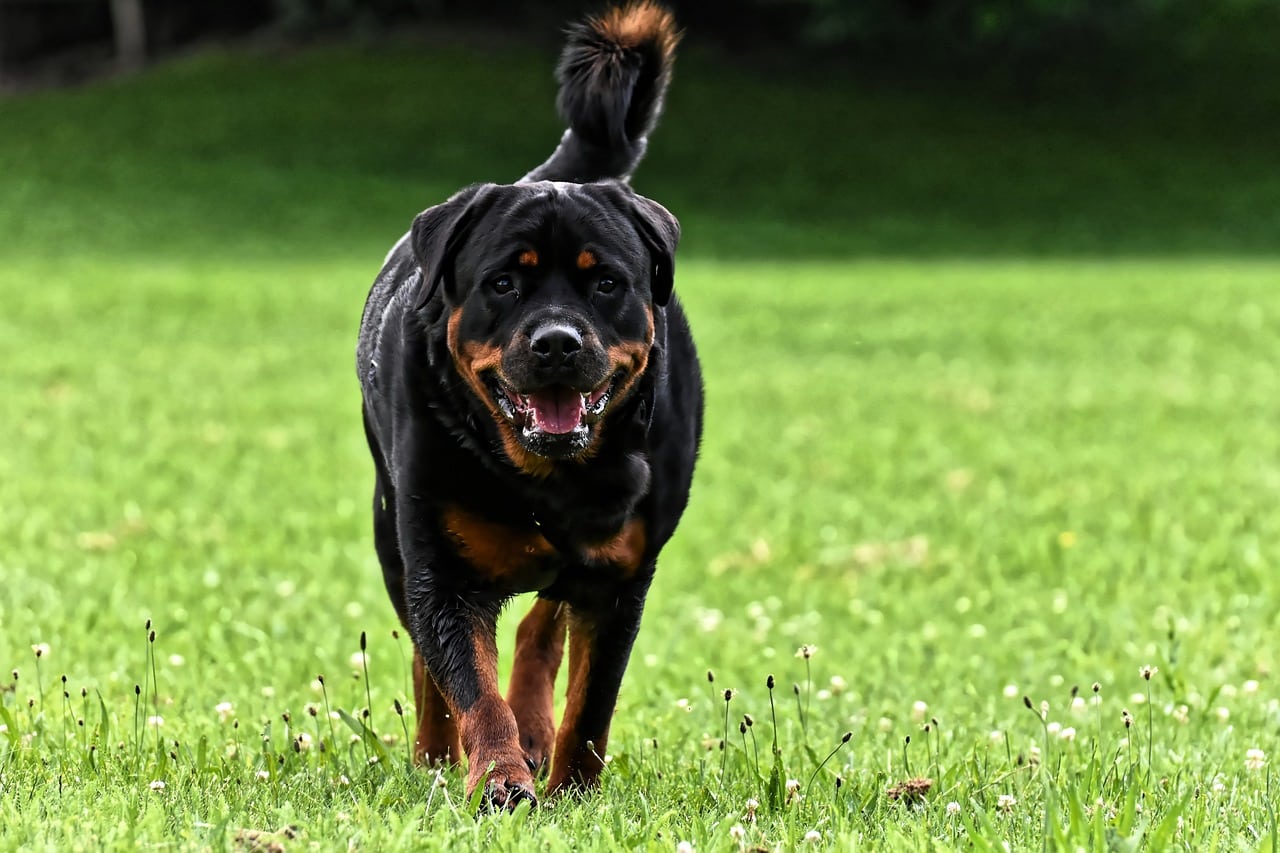
Exercise🐕
Rotties are active dogs that need about 1.5 to 2 hours of vigorous exercise each day to stay healthy and happy. Without enough exercise, they can veer toward obesity, especially if overeating. Another detrimental effect that can happen with not enough exercise is stress. Stressed-out Rottweilers can become snappy, guarded, and even outright aggressive in some cases.
Training🎾
According to the AKC’s breed standard for Rottweilers, socialization and obedience training are essential to temper the breed’s innate territorial instinct. You can start young by just teaching your Rottie pup their name and using high-value treats as a reward when they respond. After, you can move to other basic commands like sit, stay, and lie down. An early foundation in obedience will help develop a stronger bond with your dog and make them feel more secure, lessening the chances they become aggressive.
Socialization is the other key. Without ample early exposure to different people, places, animals, and sights, your dog may become afraid when dealing with new experiences. Taking your dog on regular walks with a firm hand on the leash when meeting other dogs is a good way to do this. Two other ways you can try are doggy daycare or play dates at the dog park.
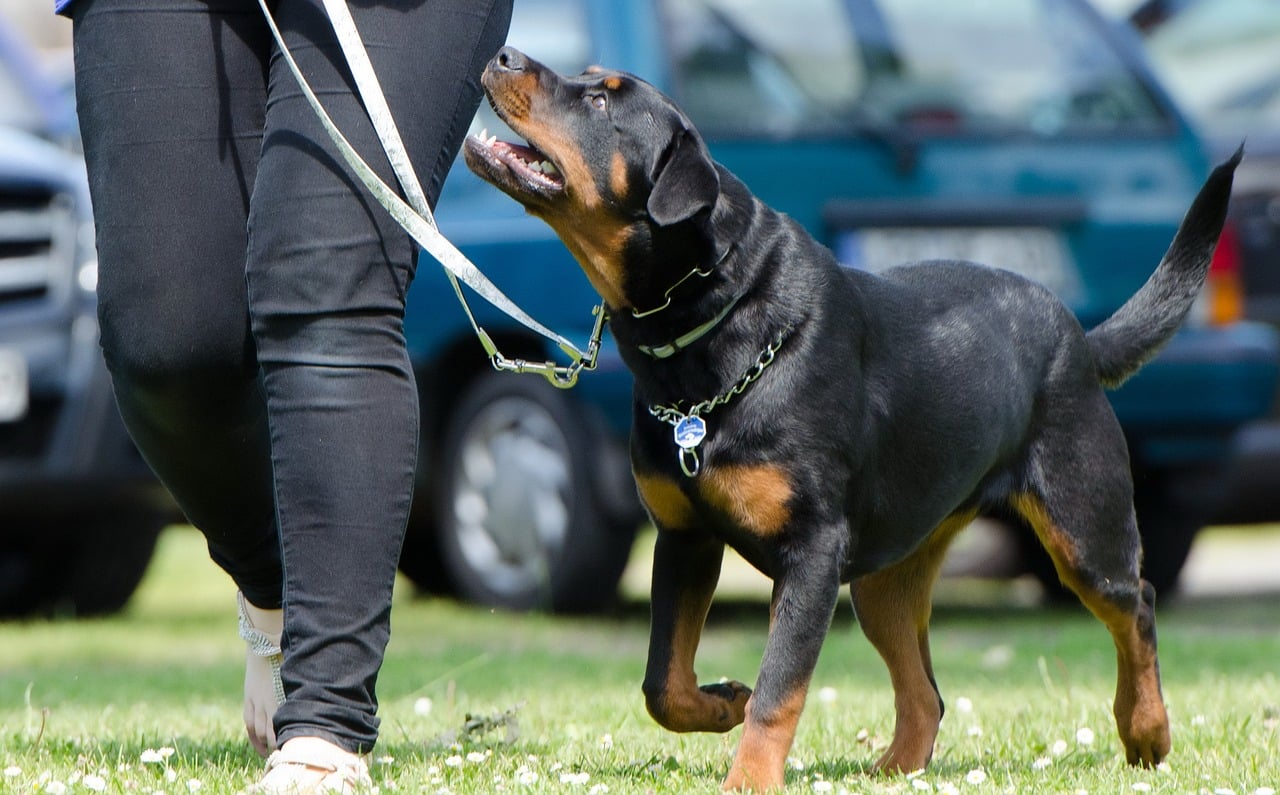
Grooming✂️
This breed has a short, glossy double coat that sheds moderately throughout the year. Twice a year during spring and fall shedding seasons, your Rottie will blow their coat and shed heavily. Normally, you want to brush them once a week to remove dead fur, while during shedding seasons, you want to brush them at least twice a week.
As far as baths go, Rotties aren’t super oily or dirty dogs by nature, so every month or two should be fine. Of course, bathe them more often if they get dirty or muddy playing outside. Lastly, you want to keep your Rottweiler’s nails neatly trimmed. They shouldn’t be so long that they clack on the floor or cause pain, but too short can cause bleeding. If you’re leery about doing it yourself, you can always hire a dog groomer to do the task for you.
Health and Conditions🏥
Rottweilers are generally healthy dogs, but they’re more prone to certain health conditions than other breeds. Health screening as a puppy and regular vet checkups can help detect conditions like these before they can become a serious problem. Let’s check out what serious and minor conditions afflict Rottweilers just below so you have a better idea of what to expect.
- Hip and elbow dysplasia
- Skin issues
- Eye conditions
- Subaortic stenosis
- Cancer
Male vs. Female
Male Rottweilers are larger and more dominant than females, who tend to be a little smaller in size and more obedient in temperament. If training is a major concern for you, it might make sense to adopt a female Rottweiler who may prove more trainable.

3 Little-Known Facts About the Rottweiler
1. Rotties Are One of the Oldest Dog Breeds
Rottweilers are thought to be one of the oldest working breeds, tracing their lineage back to Roman mastiffs. These Roman dogs are thought to have crossed the Alps into modern Germany, where they met and bred with native dogs in the Rottweil region. After that, locals found this new breed made a powerful work and guard dog, and the rest is history.
2. Rottweilers Are a Versatile Working Breed
This long-time working breed has done nearly every job under the sun. Rottweilers have driven and guarded cattle, pulled heavy carts of meat to markets, and even served in both military and law enforcement capacities. Today, they’re known to work with police in K9 units, in search-and-rescue operations, and as professional guard dogs.
3. They Almost Went Extinct
Like many working breeds, the Industrial Revolution was almost the end of the Rottweiler bloodline as working breeds were no longer needed in large numbers, thanks to inventions like the railroad and automobiles. At one point, they nearly went extinct, but thanks to a small group of devoted breeders, they’re now the 7th most popular breed in the US.
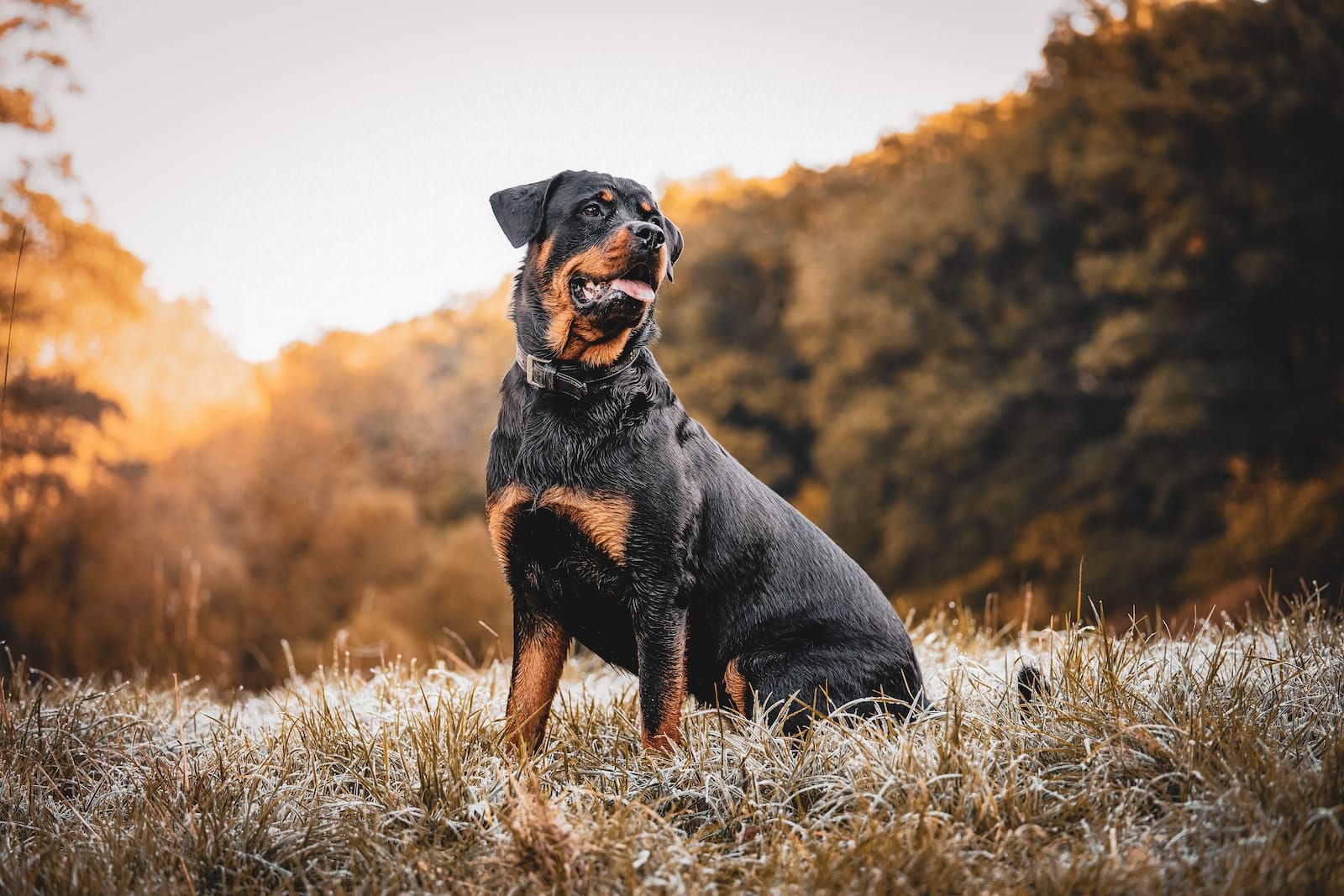

Final Thoughts
Rottweilers are a beautiful black-and-brown working behemoth of a dog, and families worldwide have fallen in love with their unflaggingly loyal nature and affectionate persona. They make great family dogs but require firm handling, obedience training, and socialization to mellow out their harsh edges.
Featured Image Credit: Kevin Seibel, Unsplash







